|
|
|
Sort Order |
|
|
|
Items / Page
|
|
|
|
|
|
|
| Srl | Item |
| 1 |
ID:
065764
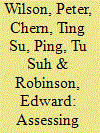

|
|
|
| 2 |
ID:
046761
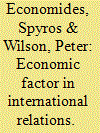

|
|
|
|
|
| Publication |
London, I.B. Tauris & Co. Ltd., 2001.
|
| Description |
xii, 227p.
|
| Standard Number |
1860646638
|
|
|
|
|
|
|
|
|
|
|
|
Copies: C:1/I:0,R:0,Q:0
Circulation
| Accession# | Call# | Current Location | Status | Policy | Location |
| 045627 | 337.1/ECO 045627 | Main | On Shelf | General | |
|
|
|
|
| 3 |
ID:
049579
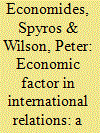

|
|
|
|
|
| Publication |
London, I.B.Tauris and Company, 2001.
|
| Description |
xii, 227p.
|
| Standard Number |
1860646638
|
|
|
|
|
|
|
|
|
|
|
|
Copies: C:1/I:0,R:0,Q:0
Circulation
| Accession# | Call# | Current Location | Status | Policy | Location |
| 045327 | 327.101/ECO 045327 | Main | On Shelf | General | |
|
|
|
|
| 4 |
ID:
117453
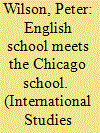

|
|
|
|
|
| Publication |
2012.
|
| Summary/Abstract |
The concept of primary international institutions is a core idea of the English School and central to those scholars from Bull to Buzan who have sought to take it in a more sociological direction. Yet the English School has traditionally found it difficult to define and identify with consistency the institutions of international society. A group of scholars, here called the "new institutionalists," have recently sought to address this problem by devising tighter definitions and applying them more rigorously. But different understandings and lists of institutions continue to proliferate. The source of the problem is the reliance on "stipulative" definitions, drawn from an increasingly abstract theoretical literature. The problem is compounded by the new institutionalists' employment of social structural and other "outsider" methods of social research. This article argues that it is only possible to empirically ground institutions, a task on which all agree, by returning to the interpretive "insider" approach traditionally associated with the school-but employing it in a much more rigorous way. To this end it makes the case for a "grounded theory" of international institutions inspired by Chicago School sociology.
|
|
|
|
|
|
|
|
|
|
|
|
|
|
|
|
| 5 |
ID:
102443
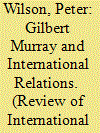

|
|
|
|
|
| Publication |
2011.
|
| Summary/Abstract |
Gilbert Murray was one of the towering figures of 20th century cultural and intellectual life, and the foremost Hellenist of his generation. He was also a tireless campaigner for peace and international reconciliation, and a pioneer in the development of international intellectual cooperation, not least in the field of International Relations (IR). Yet in IR today he is largely forgotten. This article seeks to put Murray back on the historiographical map. It argues that while in many ways consistent with the image of the inter-war 'utopian', Murray's thinking in certain significant ways defies this image. It examines the twin foundations of his international thought - liberalism and Hellenism - and their manifestation in a version of international intellectual cooperation that while aristocratic and outmoded in some respects, nonetheless contains certain enduring insights.
|
|
|
|
|
|
|
|
|
|
|
|
|
|
|
|
| 6 |
ID:
050712
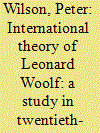

|
|
|
|
|
| Publication |
New York, Palgrave Macmillan, 2003.
|
| Description |
269p.
|
| Series |
Palgrave series in the history of international thought
|
| Standard Number |
0312294735
|
|
|
|
|
|
|
|
|
|
|
|
Copies: C:1/I:0,R:0,Q:0
Circulation
| Accession# | Call# | Current Location | Status | Policy | Location |
| 047699 | 327.1092/WIL 047699 | Main | On Shelf | General | |
|
|
|
|
| 7 |
ID:
141761
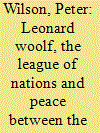

|
|
|
|
|
| Summary/Abstract |
Co-founding The Political Quarterly was one among many of Leonard Woolf's achievements during a long career as a progressive political thinker and publicist, particularly in the field of international affairs. To mark the centenary of the publication of International Government, his most innovative and influential work on the subject, this article seeks to assess Woolf's contribution. It examines the Fabian background to Woolf's work, his support for and approach to the League of Nations and his commitment to collective security as an approach to peace. Through a broader understanding of the League it argues that certain failings in the area of collective security, however profound, should not be permitted to blight an otherwise impressive intellectual legacy.
|
|
|
|
|
|
|
|
|
|
|
|
|
|
|
|
| 8 |
ID:
085080
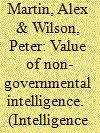

|
|
|
|
|
| Publication |
2008.
|
| Summary/Abstract |
In the UK, the Joint Intelligence Committee (JIC) has a poor track record of predicting attack. In the US, official inquiries into 9/11 identified 'a failure of imagination' to conceive of a large scale threat to the American homeland. There is a long-standing literature on surprise attack which emphasizes that clues to predict attack often exist but are not pieced together by an intelligence sector which is not structured to look in the right direction. In a world of increasingly fragmented threats and weak signals, it is apparent that much of the challenge in intelligence work now lies not in collection but in managing requirements, setting priorities, and conducting incisive analysis based on the ability to imagine new threats. One solution to a failure of imagination is to widen the range of people who can contribute to the task. Non-Governmental analysis of security issues, whether by academia, civil society or the private sector, can help to identify emerging issues and set priorities. Whilst collection of secret intelligence may always remain the preserve of specialist Government agencies, the rest of the intelligence cycle can benefit from external contributions and open source intelligence. We argue that the process of setting intelligence requirements could be opened to a wider range of actors. In conflict environments, there may be particular value in an open process to identify what each side would need to know about the other to confidently seek peace.
|
|
|
|
|
|
|
|
|
|
|
|
|
|
|
|
|
|
|
|
|